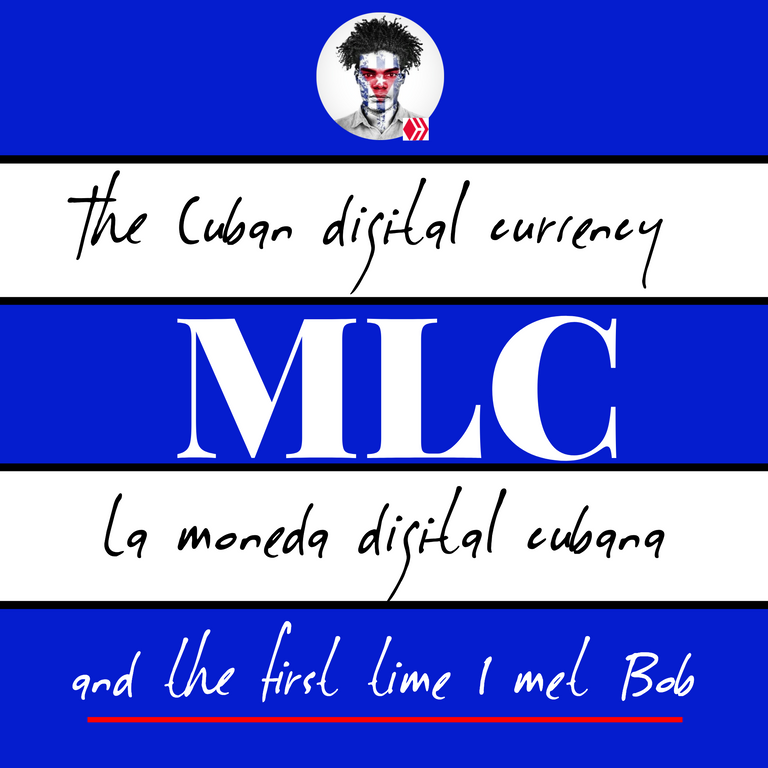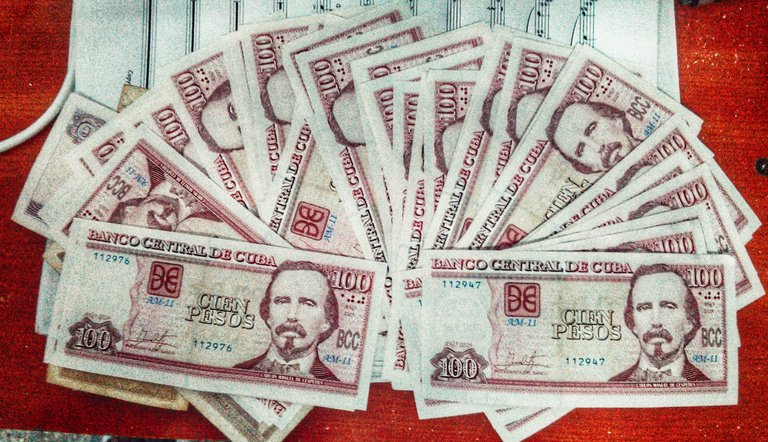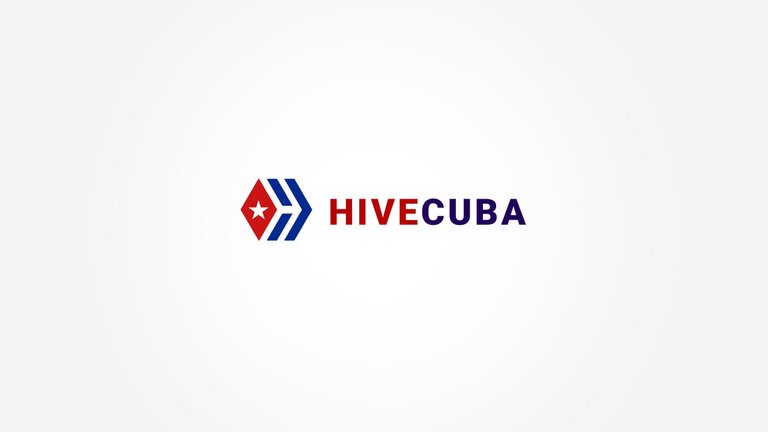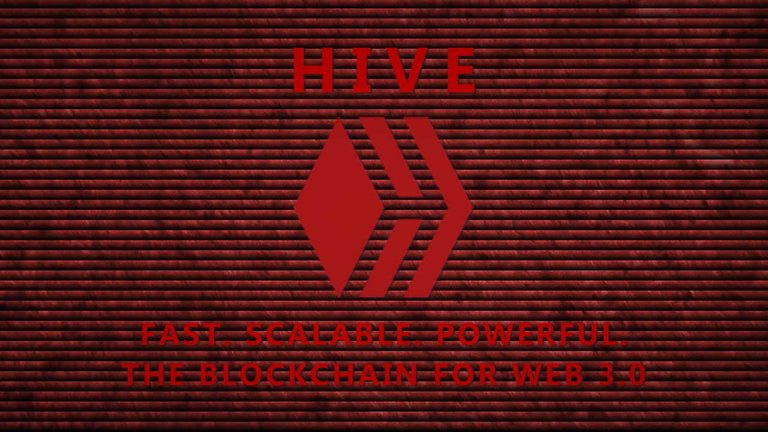[EN-ES] MLC: The Cuban digital currency (and the first time I met Bob) | My first post on LeoFinance | Dito Ferrer

We were inside a store, one of that new kind, where you can only buy by card. The line to pay at the cash register was a bit long. I had been waiting for a few minutes when I saw a guy arguing with the cashier. He was raising his arms in bewilderment as the atmosphere was getting hotter (and also because the air conditioning was broken), so I went over to listen more closely.
"But this can't be," said Bob in funny Spanish, "I have money. Look, look, money!
"You don't understand, mijo," replied the cashier, raising her voice, "that shit is no good here anymore. Not even for clean your ass."
People were starting to heat up and since in these times any pretext is a good one to start chaos, I decided to intervene. I helped Bob return half of what he was trying to buy and a timely Visa card paid for the other half, as well as part of my purchases.
We left the store and I convinced him to sit down for a couple of beers so I could explain what had happened.
"But I don't understand," said Bob after the first drink, "I came to Cuba six months ago and this money was good, what do you call, chavitos? How come now it's just paper to wipe your ass?

CUP (cuban national currency)
I explained to Bob that the correct nomenclature was CUC or convertible peso. It was our hard currency, issued domestically but backed by dollars. One CUC was the equivalent of one dollar and was the authorized currency for consuming services and buying goods in the stores (at least the ones that mattered).
"Yes, I know that" answered Bob, "I bought a quantity myself the last time I was here. I decided to save a few for when I came back. Outside of Cuba, they are useless.
Bob was right about that. The CUC was only valid within the country's borders. The visitor had to change his dollars, euros, or any other currency when he entered the country, but then on his return, he had to change that money again or take it with him as an economic souvenir.
Most of us Cubans were not paid in CUC, but in CUP, the national currency (the other national currency). We had to buy the CUC at the exchange houses or from person to person. At least we could somehow access that cash. We were constantly operating with two currencies. Until the El Ordenamiento (The Ordinance) came along.
"The Ordinance? - Bob's eyes widened and he finished his first beer. "So the government ordered that mess?"
"Not exactly," I added, and taking advantage of his enthusiasm I ordered two more beers. "The Disordering..., I meant, the Ordering was a somewhat controversial decision."
Bob was a little reluctant when I told him that the Ordinance had also come about in response to the U.S. government's decision to freeze the country's foreign dollar accounts. It was a defensive and national security measure externally, but a shock therapy internally.
Thus, with a single stroke of a pen and from one day to the next, the CUC disappeared and the long-awaited "Monetary Unification" was achieved.

"But then, what on earth did they start consuming goods and services with?" Bob interrupted. "It can't be with the CUP, which doesn't have international backing.
"Of course not, sir. To do all this we now have the MLC (freely convertible currency).
The MCL is not strictly a currency, but rather a representation of value. You can't have it in a physical model in your wallet, it only exists in the digital form inside a magnetic card. When a Cuban receives dollars, euros, or any other foreign currency, it is deposited in an MLC account, using the corresponding exchange rate concerning the dollar. Regardless of the type of currency you receive, everything is mixed in your account. That way you consume goods and services.
"Aha, I'm getting the picture," Bob nodded. It seemed that drinking beer was opening up his understanding. "Then foreigners also have to change their dollars or euros to this new currency, because the government no longer accepts cash in stores.
"But, only those who have dollars can have MLC. How does the ordinary Cuban get access to this new currency?
"By buying it, of course."
I had gotten to the heart of the matter. Cubans (most of us) have no income in international currency, so we must buy it. When we had the CUC you could go to an exchange house and buy it with Cuban pesos at a rate of 1x25. That exchange rate has been maintained so with 25 Cuban pesos one could buy one dollar which would be automatically deposited in the account at MLC.
But the bank has no liquidity whatsoever. It is as dry as a desert palm tree.
So the only option is to buy directly the MLC on the black market.

"Wait a minute!" Said Bob fanning himself with a wad of CUC bills. "If the government doesn't have dollars, then how do you guys get it on the streets?"
"As we have always done with all the things the state doesn't have," I replied. "The Cuban invents them in the air. You can buy MLC on the black market but at a much higher rate."
"How much higher?"
"Much higher. Right now it is already over 1x100."
"What the fuck! -Bob exclaimed, "It can't be that they have to buy the currency four times more expensive."
"And it will get worse."
The Cuban peso is a currency very affected by inflation. The deficiencies of our economy and the dependence on foreign currencies will continue to raise prices. The State will continue printing money to compensate for the purchasing power, so soon we will be like Venezuelans, collecting salaries of thousands and thousands of pesos.
"The situation is, how do you say, de pinga?"
"De pinga, brother. De pinga!" Now I was the one who was fanning himself with a wad of bills. It seemed surreal to me. "But who said all is lost? We can always game the flaw in the system."
"How do they do it then?"
I explained to Bob that anyone who doesn't have the facility to receive foreign currency from abroad can turn to cryptocurrencies. Several exchanges support the Cuban peso. Using payment methods with platforms such as Transfermóvil, a user can buy crypto from another user by paying in CUP. From there, you can invest that crypto in whatever you want, or top up your account in MLC, just as a family member who wants to send you a remittance would do.
It's a bit of a convoluted way for the non-tech savvy, but it's all or nothing for many of us.
"And what crypto businesses do you like to invest in if any? -Bob asked."
"Well, I'm very comfortable writing," I replied, "so, in my case, I blog on a blockchain called Hive."
"No way! Oh, my God, I'm on Hive too."
"Damn it, you asshole! It is a small world, Bob. What's your username?$
"I don't know why you keep calling me Bob, that's not what they call me."
"So, what do they call you? -I asked enthusiastically."
"They call me Dan."
ESPAÑOL
MLC: La moneda digital cubana (y la primera vez que conocí a Bob)
Estábamos dentro de una tienda, de esas de nuevo tipo, en las que solo se puede comprar por tarjeta. La fila para pagar en la caja era algo extensa. Llevaba unos minutos esperando cuando vi a un tipo discutiendo con la cajera. Alzaba sus brazos en señal de desconcierto mientras el ambiente se calentaba (y además porque el aire acondicionado estaba roto) Impedía que la cola avanzara así que me acerqué a escuchar más de cerca.
—Pero esto no puede ser —decía Bob en un gracioso español—, yo tengo dinero. ¡Mire, mire, dinero!
—Tú no entiendes, mijo —le respondía la cajera alzando la voz—, esa mierda ya no sirve aquí. Ni siquiera pa' limpiarte el c...
La gente empezaba a caldearse y como en estos tiempos cualquier pretexto es bueno para armar un caos, decidí intervenir. Ayudé a Bob a devolver la mitad de lo que intentaba comprar y una oportuna tarjeta Visa pagó el importe de la otra mitad, así como parte de mis compras.
Salimos de la tienda y lo convencí que nos sentáramos a tomar par de cervezas, así podía explicarle lo que había pasado.
—Pero no logro entender —dijo Bob después de beber el primer trago—, vine a Cuba hace seis meses y este dinero servía. ¿Cómo le dicen uds, chavitos? ¿Cómo es que ahora es solo papel para limpiarse el c...?

CUP (moneda nacional cubana)
Le expliqué a Bob que la nomenclatura correcta era CUC, o peso convertible. Era nuestra moneda dura, de emisión nacional pero con respaldo en dólares. Un CUC era el equivalente a un dólar y era la moneda autorizada para consumir servicios y comprar artículos en las tiendas (al menos en las que realmente importaban)
—Sí, eso lo sé —respondió Bob—, yo mismo compré una cantidad la última vez que estuve aquí. Decidí guardar unos cuántos para cuando regresara. Fuera de Cuba no sirven para nada.
En eso Bob estaba en lo cierto. El CUC solo era válido dentro de las fronteras del país. El visitante debía cambiar sus dólares, euros o cualquier otra moneda cuando ingresaba al país, pero luego de regreso debía cambiar otra vez ese dinero o llevárselo como souvenir económico.
A la mayoría de nosotros, los cubanos, no nos pagaban en CUC, lo hacían en CUP, la moneda nacional (la otra moneda nacional) Debíamos comprar los CUC en las casas de cambio o de persona a persona. Al menos podíamos acceder de algún modo a ese efectivo. Constantemente operábamos con dos monedas. Hasta que llegó el Ordenamiento.
—¿El Ordenamiento? — Bob abrió los ojos y se terminó la primera cerveza—. ¿Entonces el Gobierno ordenó aquel desastre?
—No exactamente —añadí, y aprovechando su entusiasmo pedí dos cervezas más—. La Tarea Desordenamiento..., quise decir Ordenamiento fue una decisión un tanto polémica.
Bob se mostró un poco reticente cuando le dije que el Ordenamiento también se había producido como respuesta a la desición del gobierno de los Estados Unidos de congelar las cuentas en dólares del país en el extranjero. Era una medida defensiva y de seguridad nacional hacia lo externo, pero una terapia de choque hacia lo interno.
Así, de un solo plumazo y de un día para otro, desaparecía el CUC y se conseguía la muy esperada "Unificación Monetaria."

—Pero entonces. ¿Con qué rayos empezaron a consumir bienes y servicios? —interrumpió Bob—. No puede ser con el CUP, ese no tiene respaldo internacional.
— Claro que no, mister. Para hacer todo eso ahora tenemos al MLC (moneda libremente convertible)
El MLC no es estrictamente una moneda, sino más bien una representación de valor. No puedes tenerla en modo físico en tu billetera, solo existe de manera digital dentro de una tarjeta magnética. Cuando un cubano recibe dólares, euros o cualquier otra moneda extranjera se le deposita en una cuenta en MLC, utilizando el tipo de cambio correspondiente con respecto al dólar. Independientemente del tipo de moneda que recibas todo se mezcla dentro de tu cuenta. De esa manera consumes bienes y servicios.
—Ajà, voy entendiendo —Bob asintió con la cabeza. Al parecer el consumo de cerveza le abría el entendimiento—. Entonces los extranjeros también tienen que cambiar sus dólares o euros a esta nueva moneda, porque el gobierno ya no acepta efectivo en las tiendas.
»Pero, solo puede tener MLC quien tiene dólares. ¿Cómo accede el cubano de a pie a esta nueva moneda?
— Comprándola, por supuesto.
Había llegado al meollo del asunto. Los cubanos (la mayoría de nosotros) no tenemos ingresos en divisas internacionales, por lo que debemos comprarlas. Cuando teníamos el CUC se podía ir a una casa de cambio y comprarlo con pesos cubanos a razón de 1x25. Esa tasa de cambio se ha mantenido así que con 25 pesos cubanos uno podría comprar un dólar que sería automáticamente depositado en la cuenta en MLC.
Pero el banco no tiene liquidez de ningún tipo. Está tan seco como palmera del desierto.
Entonces la única opción es comprar directamente el MLC en el mercado negro.

— ¡Espera un momento! —dijo Bob abanicándose con un fajo de billetes de CUC—. Si el Gobierno no tiene dólares. ¿Entonces cómo ustedes lo consiguen en las calles?
— Como siempre lo hemos hecho con todas las cosas que no tiene el Estado —respondí—. El cubano las inventa en el aire. Puedes comprar MLC en el mercado negro, pero con una tasa muy superior.
— ¿Cuán superior?
— Muuuy superior. Ahora mismo ya pasa de 1x100.
—What da fuck! —exclamó Bob— No puede ser que tengan que comprar la divisa cuatro veces más cara.
— Y se pondrá peor.
El peso cubano es una moneda muy afectada por la inflación. Las deficiencias de nuestra economía y la dependencia de las monedas extranjeras van a seguir encareciendo los precios. El Estado seguirá imprimiendo dinero para compensar la capacidad de compra, así que pronto estaremos como los venezolanos, cobrando salarios de miles y miles de pesos.
— La situación está, ¿cómo le dicen uds, de pinga?
— ¡De pinga, hermano. De pinga! —ahora era yo quien se abanicaba con un fajo de billetes. Me pareció surrealista—. Pero, ¿Quien dijo que todo está perdido? Siempre podemos jugar con el defecto del sistema.
— ¿Cómo lo hacen entonces?
Le expliqué a Bob que, quien no tiene la facilidad de recibir divisas del extranjero, puede recurrir a las criptomonedas. Existen varios exchanges que admiten el peso cubano. Utilizando métodos de pago con plataformas como Transfermóvil, un usuario puede comprarle crypto a otro pagándole en CUP. A partir de ahí, puedes invertir esa crypto en lo que quieras, o recargarte tu cuenta en MLC, tal y como lo haría un familiar que quisiera mandarte una remesa.
Es una vía un tanto enrevesada para los que no conocen de tecnología, pero es el todo o nada para muchos de nosotros.
— Y en qué negocios crypto te gusta invertir, si lo haces? —preguntó Bob.
— Bueno, me siento muy cómodo escribiendo —le respondí—, así que, en mi caso, blogueo en una blockchain llamada Hive.
— ¡No puede ser! ¡Oh, my God! Yo también estoy en Hive.
— ¡Coño, asere! El mundo es chiquito de veras, Bob. ¿Cual es tu usuario?
— No sé por qué me sigues llamando Bob, así no es como me llaman.
— ¿Y, cómo te llaman? —le pregunté entusiasmado.
— Ellos me llaman Dan.
This text corresponds to the initiative of My first post in LeoFinance. If you want to know more details here // Este texto corresponde a la iniciativa de Mi primer post en LeoFinance. Si quieres conocer más detalles aquí


Congratulations @ditoferrer! You have completed the following achievement on the Hive blockchain and have been rewarded with new badge(s):
Your next target is to reach 4000 upvotes.
You can view your badges on your board and compare yourself to others in the Ranking
If you no longer want to receive notifications, reply to this comment with the word
STOPCheck out the last post from @hivebuzz:
Support the HiveBuzz project. Vote for our proposal!
Ahhhh, very cool ending! Yes and about the currency was interesting to read, I still have a dream to go to Cuba, apparently I will have to prepare before the trip))
You'll need to prep your things for sure. The money you are going to spend(and convert it into MLC) and the cash you need untouched, for the comeback. Greetings, thanks for reading
!PIZZA
Great advice, thank you! Have a great day!🙌
PIZZA Holders sent $PIZZA tips in this post's comments:
ditoferrer tipped stdd (x1)
@ditoferrer(2/10) tipped @miguelgonzalezms (x1)
You can now send $PIZZA tips in Discord via tip.cc!
Thanks for sharing this amazing post and have a wonderful day
Your welcome! And thanks for reading
Te quedó muy bien el post, explicas con mucho ingenio lo que pasamos los cubanos
Seguro mi hermano.Un poquito de humor a un tema difícil e injusto. Gracias por leer
!PIZZA
Hi @ditoferrer, thanks for posting using the #newlion tag, we hope to see more posts from you published directly through leofinance.io soon! Today we are launching a new Leo Finance Challenge, we hope you join us!
Posted Using LeoFinance Beta
Thanks to you all. Keep with the good work.